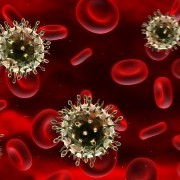 Photo: Getty Images
Photo: Getty Images
Scientists working to find new treatments for the H1N1 flu said an established procedure used to treat other illnesses may also work to treat the flu. Convalescent plasma therapy is a treatment that has been used for many years to treat a variety of diseases, including the 1918 influenza pandemic. Researchers in Hong Kong now believe that this treatment may be helpful in saving the lives of patients with severe cases of the H1N1 flu.
Plasma is the liquid that makes up over half the volume in human blood. It contains water, proteins, hormones, and other components including clotting factors. Other blood cells such as red cells and platelets “swim” in the plasma. When the body produces antibodies to fight off an infection such as the flu, the antibodies are carried throughout the body in blood plasma.
Donated blood is commonly separated into its components including red cells and plasma. When plasma is collected from a patient who has recovered from a severe flu, the antibodies that fought off the flu virus are still present in the plasma and can be donated to someone who is sick. Because flu antibodies are targeted specifically at the flu virus, they will continue to fight the flu even after they are injected into someone else. This boost of antibodies can make the difference for someone whose own body is having a hard time fighting off the flu virus.
During the height of the 2009 H1N1 epidemic, researchers in Hong Kong tested the idea that convalescent plasma therapy could be effective against this type of flu. Ninety-three patients who required intensive care in Hong Kong area hospitals were included in the study. Twenty patients agreed to the plasma therapy. The remaining 73 chose not to receive plasma therapy and were used as the control group for the study. The results showed that 20 percent of patients who received plasma therapy died as a result of the flu, compared to 55 percent of patients who did not receive plasma therapy. None of the patients who received plasma therapy developed any negative side effects as a result of the treatment.
Study author Kwok-Yung Yuen, MD, of the University of Hong Kong in China said, “One of the benefits of convalescent plasma treatment in patients with severe influenza A infection is that it does not suffer from the problem of drug resistance." Drug resistance occurs when a bacteria or virus adapts to a medication used to treat it and become immune to the treatment. Because antibodies are created by the body to be a direct match to the virus, drug resistance will not develop with this type of treatment.
One disadvantage of the therapy is that the appropriate antibodies are not available for treatment until after a group of people develops the disease and then recovers so their antibodies can be harvested. But once the antibodies have been developed, they will continue to be effective against future outbreaks of the flu until the virus changes enough to become a different variety of flu. This may one day lead to the inclusion of flu antibodies in vaccines against the flu.
The World Health Organization (WHO) declared that the 2009 H1N1 world pandemic was over on August 10, 2010. But scientists say the virus is still in existence and will probably continue to spread around the world for many years, just like a seasonal flu virus. This means options for treatment are still important to world health.
Sources:
Science Daily
Centers for Disease Control and Prevention
Oxford Journals: Clinical Infectious Diseases
Medpage Today
Mayo Clinic






Add a CommentComments
There are no comments yet. Be the first one and get the conversation started!